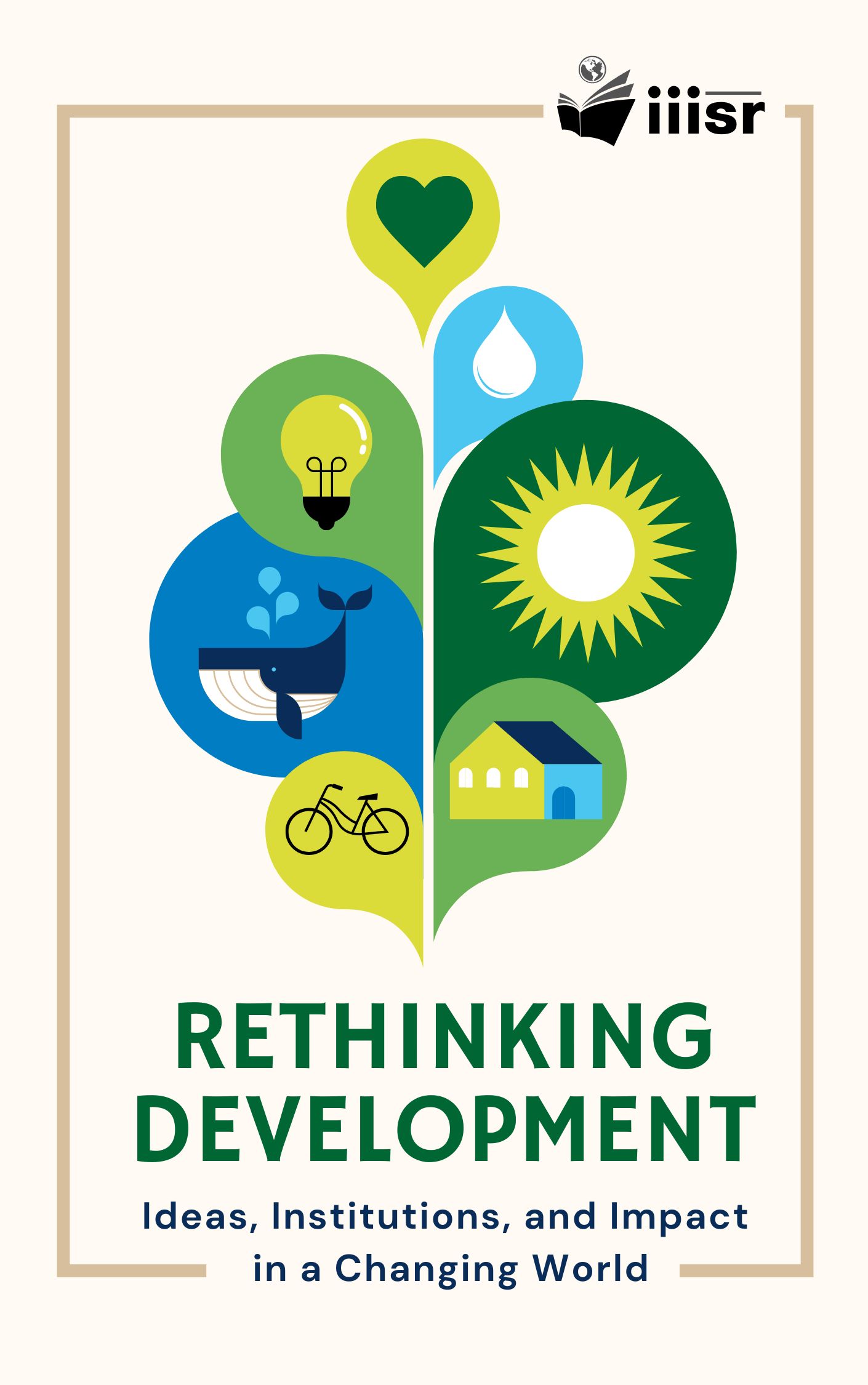Post-Pandemic Development Priorities: A Multidisciplinary Outlook.
Authors: Sharma, K., & Sachdeva, S. K.
| Open Access |
This chapter examines post-pandemic development priorities through a multidisciplinary lens. It argues that the COVID-19 pandemic exposed vulnerabilities in existing development paradigms, necessitating a shift from growth-centric metrics to those focused on human well-being, ecological balance, and structural justice. The chapter advocates for integrating insights from public health, environmental studies, economics, and other disciplines to address interconnected crises. It emphasizes the importance of resilience, inclusivity, and sustainability in development strategies, and calls for a transformation of institutions and governance mechanisms rather than a return to the pre-pandemic status quo.
Cite this chapter:
Sharma, K., & Sachdeva, S. K. (2025). Post-Pandemic Development Priorities: A Multidisciplinary Outlook. In Rethinking Development: Ideas, Institutions, and Impact in a Changing World (pp. 130-147). Indian Institute of Industrial and Social Research. ISBN: 979-8-286-09875-0.
References
Ahuja, D. K. (2021). The Retail Revolution: Synergy of E-Tail and Brickand-Mortar in a Post-Pandemic Era. Journal of Production, Operations Management and Economics, 12, 76–83. https://doi.org/10.55529/jpome.12.76.83
Ajithgopi, A., Sudhakar, K., & Keng, N. W. (2021). Solar PV Microgrids Implementation model: A case study of Local Self Governments in the Indian State of Kerala. IOP Conference Series: Materials Science and Engineering, 1068(1), 012024. https://doi.org/10.1088/1757-899x/1068/1/012024
Antonucci, T. C. (2019). The role of gerontological psychology in achieving the un’s sustainable development goals. Innovation in Aging, 3(Suppl 1), S76. https://doi.org/10.1093/geroni/igz038.296
Aruvali, T., Marchi, M. D., & Rauch, E. (2024, January 1). Monitoring system architecture for long-term resilience in manufacturing. https://doi.org/10.1063/5.0189301
Bach, T. (2014). Intergenerational Justice. 1845–1846. https://doi.org/10.1002/9781118474396.wbept0518
Bekkum, W. (2011). Many Nations And One God (pp. 275–288). brill. https://doi.org/10.1163/ej.9789004188433.i-578.88
Benoit, W. L. (2016). Political Election Debates. 1–10. https://doi.org/10.1002/9781118541555.wbiepc127
Bermejo, R. (2014). Sustainable Development in the Brundtland Report and Its Distortion (pp. 69–82). springer netherlands. https://doi.org/10.1007/978-94-017-8981-3_5
Bhat, Z. H., & Saba, N. (2025). Navigating turbulence: leadership evolution in crisis management through response–recovery frameworks. International Journal of Organizational Analysis. https://doi.org/10.1108/ijoa-02-2024-4254
Candiotto, L. (2023). Emotions in knowledge production. Interdisciplinary Science Reviews, 48(2), 312–328. https://doi.org/10.1080/03080188.2023.2179722
Chai, Y., & Zeng, Y. (2018). Social capital, institutional change, and adaptive governance of the 50-year-old Wang hilltop pond irrigation system in Guangdong, China. International Journal of the Commons, 12(2), xx. https://doi.org/10.18352/ijc.851
Cho, D. T. (2024). Civil Conflict’s Impact on the Pursuit of Inclusivity, Safety, Resilience and Sustainability in Anglophone Cities of Cameroon. Urban Forum, 35(4), 475–497. https://doi.org/10.1007/s12132-024-09513-6
Clott, L. (2017). The Human Security Framework (pp. 234–259). routledge. https://doi.org/10.4324/9781315679990-11
Coote, A. (2020). Universal basic services and sustainable consumption. Sustainability: Science, Practice and Policy, 17(1), 32–46. https://doi.org/10.1080/15487733.2020.1843854
Dengler, C. (2021). Degrowth (pp. 369–377). routledge. https://doi.org/10.4324/9780429020612-43
El Alaoui, A. (2019). Education and knowledge are fundamental to social justice and economic growth. International Journal of Social Sciences and Education Research, 5(3), 279–293. https://doi.org/10.24289/ijsser.584500
Fafard, P., De Leeuw, E., & Cassola, A. (2022). Introduction: Virchow Revisited on the Importance of Public Health Political Science (pp. 3–14). springer. https://doi.org/10.1007/978-3-030-98985-9_1
Fairweather, C. (2021). “We Can’t Just Wrap Ourselves in the Flag:” Labour Nationalism, Global Solidarity, and the 2016 Fight to Save gm Oshawa. Journal of Labor and Society, 25(3), 367–394. https://doi.org/10.1163/24714607-bja10040
Ferreira, R., Cannon, C. E., Buttell, F., & Davidson, T. (2023). Explaining Disaster and Pandemic Preparedness at the Nexus of Personal Resilience and Social Vulnerability: An Exploratory Study. Disaster Medicine and Public Health Preparedness, 17. https://doi.org/10.1017/dmp.2023.78
Fox, I. E. (2023). Hashtags, Hierarchies and Hegemonies: Mainstream Digital Feminist Activism And Intersectional Critiques. AoIR Selected Papers of Internet Research. https://doi.org/10.5210/spir.v2022i0.13001
Gao, X., & Zheng, H. (2017). Environmental Concerns, Environmental Policy and Green Investment. International Journal of Environmental Research and Public Health, 14(12), 1570. https://doi.org/10.3390/ijerph14121570
Garcés Velástegui, P. (2020). Humanizing development: taking stock of Amartya Sen’s capability approach. Problemas Del Desarrollo. Revista Latinoamericana de Economía, 51(203). https://doi.org/10.22201/iiec.20078951e.2020.203.69586
Gavin, B., Lyne, J., & Mcnicholas, F. (2020). Mental health and the COVID-19 pandemic. Irish Journal of Psychological Medicine, 37(3), 156–158. https://doi.org/10.1017/ipm.2020.72
Glatz, C., & Schwerdtfeger, A. (2022). Disentangling the Causal Structure Between Social Trust, Institutional Trust, and Subjective Well-Being. Social Indicators Research, 163(3), 1323–1348. https://doi.org/10.1007/s11205-022-02914-9
Gonzalez, K. A., Arora, S., Sostre, J., Lockett, G. M., & Abreu, R. L. (2021). “Previous resilience has taught me that I can survive anything:” LGBTQ resilience during the COVID-19 pandemic. Psychology of Sexual Orientation and Gender Diversity, 8(2), 133–144. https://doi.org/10.1037/sgd0000501
Guerra, F., & Syed, M. D. (2023). Identifying mindsets for urban sustainability transformation: insights from Urban Labs. Sustainability Science, 19(2), 523–537. https://doi.org/10.1007/s11625-023-01437-7
Gustin, J. F. (2020). Disaster & Recovery Planning: river. https://doi.org/10.1201/9781003151777
Hayden, J., & Wai, S. (2013). Community-Based Approaches to Early Childhood Development (pp. 275–289). oxford university pressnew york. https://doi.org/10.1093/acprof:oso/9780199922994.003.0014
Hoelting, K. R., Martinez, D. E., Schuster, R. M., & Gavin, M. C. (2024). Advancing knowledge pluralism and cultural benefits in ecosystem services theory and application. Ecosystem Services, 65, 101583. https://doi.org/10.1016/j.ecoser.2023.101583
Huang, X., Li, X., & Wang, S. (2022). The Inequities in the United States During the COVID-19 Pandemic (pp. 85–96). springer. https://doi.org/10.1007/978-3-031-11775-6_8
Ivic, S. (2020). Vietnam’s Response to the COVID-19 Outbreak. Asian Bioethics Review, 12(3), 341–347. https://doi.org/10.1007/s41649-020-00134-2
Jagannathan, S., & Packirisamy, P. (2021). Autoethnography and Personal Experience as an Epistemic Resource (pp. 142–159). routledge india. https://doi.org/10.4324/9780429352492-8
Kaplan-Hallam, M., Satterfield, T., & Bennett, N. (2018). Catching sea cucumber fever in coastal communities: Conceptualizing the impacts of shocks versus trends on social-ecological systems. center for open science. https://doi.org/10.31230/osf.io/4k9se
Katikireddi, S. V., Higgins, M., Smith, K. E., & Williams, G. (2013). Health inequalities: the need to move beyond bad behaviours. Journal of Epidemiology and Community Health, 67(9), 715–716. https://doi.org/10.1136/jech-2012-202064
Kay, C. (2018). Modernization and dependency theory (pp. 15–28). routledge. https://doi.org/10.4324/9781315162935-2
Kroes, J., Land, A., Manikas, A. S., & Klein, F. (2024). Gender diversity and injustice among supply chain executives: exploring outcomes that advance social justice. International Journal of Operations & Production Management, 45(3), 677–699. https://doi.org/10.1108/ijopm-06-2023-0524
Kumar, T. K. V. (2022). Police and the Pandemic Response in India-Findings from Kerala. Policing: A Journal of Policy and Practice, 16(4), 794–809. https://doi.org/10.1093/police/paac020
Latief, J., Haeruddin, H., Darsikin, D., & Rahman, A. (2023). Evaluation For Learning Development During The Covid-19 Pandemic in Pasangkayu. Journal of Scientific Research, Education, and Technology (JSRET), 2(2), 496–511. https://doi.org/10.58526/jsret.v2i2.105
Li, C., Hu, Y., Shi, Z., Deng, Z., Bryan, B. A., Wang, L., Li, W., Yu, S., & Wang, Z. (2023). Responses to the COVID-19 pandemic have impeded progress towards the Sustainable Development Goals. Communications Earth & Environment, 4(1). https://doi.org/10.1038/s43247-023-00914-2
Li, Y., Bian, X., & Qi, W. (2023). Research on the Evolution Mechanism of the Integration System of Culture and Tourism Industry based on Self-organization Theory (pp. 857–867). atlantis bv. https://doi.org/10.2991/978-94-6463-042-8_122
Lusiandari, R., & Pandin, M. (2021). Historical Development: Thinking History for the 21st Century. mdpi ag. https://doi.org/10.20944/preprints202106.0303.v1
Madaan, G., Gowda, K. R., & Kaur, M. (2023). Adapting Corporate Social Responsibility in Times of Crisis: Analyzing Indian Companies’ Contributions to Sustainable Development Goals During the COVID-19 Pandemic. Review of Sdgs in Emerging Countries, 5, e23. https://doi.org/10.37497/2965-7393.sdgs-countries.v5.n00.23
Marshall, W. C., & Rochon, L.-P. (2019). Public Banking and Post-Keynesian Economic Theory. International Journal of Political Economy, 48(1), 60–75. https://doi.org/10.1080/08911916.2018.1550947
Martin, E., Perine, C., Ratcliffe, J., & Lee, V. (2018). Decentralized Governance and Climate Change Adaptation: Working Locally to Address Community Resilience Priorities (pp. 3–22). springer. https://doi.org/10.1007/978-3-319-72874-2_1
Martin, G. R. (2017). Birds Underwater: A Paucity of Information (pp. 161–182). oxford university pressoxford. https://doi.org/10.1093/oso/9780199694532.003.0007
Mihalopoulos, N. L. (2022). Equity and Inclusivity (pp. 37–42). springer. https://doi.org/10.1007/978-3-031-18455-0_6
Moses, O. (2016). Why We Need the Imagination to Help Us With Emotional Uncertainty. The American Journal of Psychology, 129(2), 215–219. https://doi.org/10.5406/amerjpsyc.129.2.0215
Mumtaz, Z. (2022). Conclusions, Implications, and Avenues of Future Research (pp. 225–237). springer nature singapore. https://doi.org/10.1007/978-981-19-6474-9_9
Natenson, M. (2015). The World Bank Group’s Human Rights Obligations Under the United Nations Guiding Principles on Business and Human Rights. Berkeley Journal of International Law, 33(2). https://doi.org/10.15779/z38tc5j
Nelson, J., Stahl, G., & Wallace, D. (2017). Race, Class, And Gender In Boys’ Education: Repositioning Intersectionality Theory. Culture, Society and Masculinities, 7(2), 171–187. https://doi.org/10.3149/csm.0702.171
O’Connor, K., & Shahwan, U. (2025). Do different governance actors approach the concept of network governance differently within a developing fragile society? International Review of Public Policy, 7(1). https://doi.org/10.4000/13zev
Opolska, Z. (2021). How has Norway beaten the COVID-19 pandemic? Journal of Health Inequalities, 7(1), 7–11. https://doi.org/10.5114/jhi.2021.107951
Pavolová, H., Šimková, Z., Wittenberger, G., Seňová, A., Khoreshok, A., Vöth, S., Nuray, D., Marasová, D., Petrova, M., Janocko, J., Stefanek, P., Tan, Y., & Atrushkevich, V. (2019). Macroeconomic indicators of raw material policy in Slovakia. E3S Web of Conferences, 134, 03017. https://doi.org/10.1051/e3sconf/201913403017
Pinto, T. M., & Figueiredo, B. (2023). Positive coparenting previous to the COVID-19 pandemic can buffer regulatory problems in infants facing the COVID-19 pandemic. Infancy, 28(6), 1067–1085. https://doi.org/10.1111/infa.12561
Power, K. (2014). Social Contracts, Simple Rules and Self-organization: A Perspective on Agile Development (pp. 277–284). springer. https://doi.org/10.1007/978-3-319-06862-6_21
Rajapakse, N. (2016). Amartya Sen’s Capability Approach and Education: Enhancing Social Justice. Revue LISA / LISA e-Journal, vol. XIV-n°1. https://doi.org/10.4000/lisa.8913
Rochon, L.-P. (2023). THE FUTURE OF POST-KEYNESIAN ECONOMICS: Post-Keynesian Economics at 50. Journal of Philosophical Economics, Volume XVI(Symposium: Is there a future…). https://doi.org/10.46298/jpe.10890
Sadeghpour, M., & D’Angelo, J. (2022). World Englishes and ‘Global Englishes’: competing or complementary paradigms? Asian Englishes, 24(2), 211–221. https://doi.org/10.1080/13488678.2022.2076368
Scharpf, J. (2017). The Challenge of Guideline Development When Evidence Is Sparse. Otolaryngology–Head and Neck Surgery, 157(3), 383–384. https://doi.org/10.1177/0194599817717676
Shinde, A., & Jeevannavar, J. (2023). Survey on Awareness of Antenatal Physiotherapy among Women from Rural and Urban Populations of Maharashtra. Indian Journal of Physiotherapy & Occupational Therapy – An International Journal, 17(2), 15–18. https://doi.org/10.37506/ijpot.v17i2.19227
Sorg, C., & Groos, J. (2024). Rethinking economic planning. Competition & Change, 29(1), 3–16. https://doi.org/10.1177/10245294241273954
Sotnikova, L. V. (2022). Change in estimated liabilities for the dismantling of fixed assets. Buhuchet v Sel’skom Hozjajstve (Accounting in Agriculture), 5, 5–20. https://doi.org/10.33920/med-17-2205-01
Suharko, S. (2020). Urban environmental justice movements in Yogyakarta, Indonesia. Environmental Sociology, 6(3), 231–241. https://doi.org/10.1080/23251042.2020.1778263
Symvoulakis, E., Spandidos, D., Sourvinos, G., & Lionis, C. (2020). COVID-19 pandemic: Monitoring space-time data and learning from global experience. Experimental and Therapeutic Medicine, 20(5), 1. https://doi.org/10.3892/etm.2020.9201
Thinh, M. P. (2025). Rethinking educational equity in the Global South: Alternative pathways for Myanmar students in conflict-affected contexts. Policy Futures in Education. https://doi.org/10.1177/14782103251348084
Thompson, S. (2021). The Need and Desire for Inclusive Universities: A Perspective from Development Studies. Social Inclusion, 9(3), 27–31. https://doi.org/10.17645/si.v9i3.4096
Thürer, M., Stevenson, M., Godinho Filho, M., & Fredendall, L. D. (2014). Small manufacturers in Brazil: competitive priorities vs. capabilities. The International Journal of Advanced Manufacturing Technology, 74(9–12), 1175–1185. https://doi.org/10.1007/s00170-014-6042-x
Toft, J. (2021). Neoliberalism. https://doi.org/10.1093/acrefore/9780199975839.013.1409
Utami, D. A., & Ramadhani, Y. C. (2025). Change Management Strategies in Improving Organizational Resilience: An Approach Based on Innovation, Digitalization, and Adaptive Leadership. Maneggio, 2(1), 201–212. https://doi.org/10.62872/zbqqsj95
Vermeulen, P. (2020). Literature and the Anthropocene. routledge. https://doi.org/10.4324/9781351005425
Vishnu, A., Santhosh, A., Sivakumar, D., & Roy, M. (2025). Community Climate Resilience Building: A Case Study of Tidal Flooding in Kerala, India. Proceedings of the International ISCRAM Conference. https://doi.org/10.59297/8czq0n46
Waheduzzaman, W., & As-Saber, S. (2015). Community participation and local governance in Bangladesh. Australian Journal of Political Science, 50(1), 128–147. https://doi.org/10.1080/10361146.2014.989194

